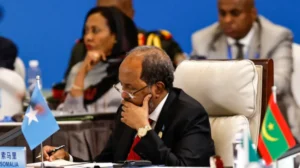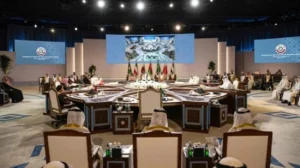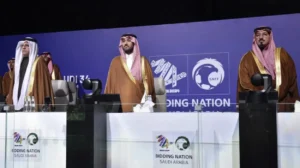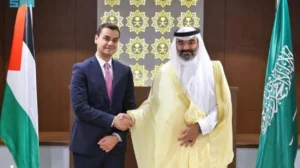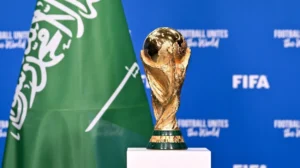- Home
- Why Boycott?
- Human Rights Violations
- Migrant Workers Exploitation & Kafala System Abuse
- Saudi Arabia’s War Crimes
- Freedom of Press and media censorship
- Torture And Unfair Trials
- Saudi Arabia’s Anti-Climate Agenda
- Bogus Stadium Infrastructure
- Sportwashing & Political image
- Saudi Arabia’s Unfair bidding Process
- FIFIA Corruption and Transparency issues
- Poor Treatment of LGBTQ community
- Security risks for spectators
- News
- Get Involved
- Contact Us
Security Risks
FIFA World Cup 2034: Why Saudi Arabia’s Security Threats Put Tournament at Risk
Saudi Arabia’s winning of the 2034 FIFA World Cup hosting rights has sparked a heated discussion. Nevertheless, the country faces major security challenges that would render it an unsuitable location to organize such an event. However, their ambitions to be a global sports hub, circumstances seem to run against them. Questions about Saudi Arabia’s ability to ensure the safety and freedom of players, fans, and officials abound in light of geopolitical turmoil, terrorism risks, human rights abuses, cyber surveillance, and strict religious policies. Here are the reasons Why boycott Saudi 2034 FIFA?
-
Geopolitical Instability and Regional Conflicts
Surrounded by persistent military conflicts and historical strategic rivalries, Saudi Arabia is found in one of the most unstable parts of the world. Due to these threats, it is almost impossible to give security to the fans and other spectators.
- The Global Peace Index (GPI) 2023 shows Saudi Arabia at 119th among 163 countries, hence quite unstable.
- Since 2015, Saudi Arabia has spearheaded a military operation in Yemen that has claimed over 377,000 lives according to the United Nations.
- For many years, Iran and Saudi Arabia have been regional adversaries that typically back opposite groups in Middle Eastern fighting. Rising hostility could have a direct influence on security for the World Cup.
- Threat from Regional Militias: Groups including the Houthi rebels in Yemen bombed Saudi cities, including the capital Riyadh, using missiles and drones.
- Hosting the World Cup in a high-risk political situation is a major concern given the millions of teams and fans traveling to Saudi Arabia.
2. High Risk of Terrorism
With Saudi Arabia being a target for organizations like Al-Qaeda and ISIS, there is some worry about the safety of an international event like the FIFA World Cup 2034. The track record of this country does seem unfit to host such a big event.
- The Global Terrorism Index (GTI) 2023 classifies Saudi Arabia under a “medium” terrorism threat level. Prominent events are:
- Nearly 50% of the nation’s oil supply came under threat from 2019 drone and missile strikes on the oil installations of Saudi Aramco, hence national security issues are revealed.
- A 2015 suicide attack at a Saudi mosque in Eastern Province took 21 lives and highlighted the susceptibility of public spaces to assaults.
- The danger of stadium explosions: Terrorist organizations have in the past aimed at sports complexes, including the 2015 Paris assaults in which the State de France was one aim.
- FIFA should look at the terrorism hazards in Saudi Arabia considering the millions of supporters attending games.
3. Cyber Surveillance and Privacy Violations
Saudi Arabia is using high technology to monitor the activities of their journalists. Whoever tries to oppose these ideas is usually treated with injustice. The spyware and other such equipment directly violate the freedom of these people. Journalist Jamal Khashoggi’s 2018 slaying included Saudi intelligence monitoring him using digital and bodily surveillance.
- Reports from Amnesty International verify that Saudi Arabia has employed Israeli-produced Pegasus spyware to track journalists and critics.
- FIFA reporters, squads, and supporters could have their personal devices, emails, and calls monitored.
- Though a worldwide sports competition should offer secrecy and safety, Saudi Arabia’s past cyber espionage is cause for great concern.
4. Human Rights Violations and Security Crackdowns
Saudi Arabia’s bad human rights history contradicts FIFA’s drive for inclusion and security. With so many atrocities on the citizens and migrants alike, this country seems unsuitable.
- On the World Justice Project Rule of Law Index, Saudi Arabia places 103rd among 139 nations.
- Citing large detentions, censorship, and the stifling of opposition, Freedom House regards Saudi Arabia as “Not Free.”
- Human Rights Watch and Amnesty International document instances of torture, extrajudicial executions, and miscarriages of justice.
5. Weak Emergency Response and Disaster Management
Saudi Arabia’s past of mismanaging major crowds makes experts wonder whether it can control World Cup stadium capacity.
- Among the worst crowd disasters in recent history was the 2015 Mina stampede on the Hajj pilgrimage, which killed over 2,400 people.
- Saudi officials got slammed for their sluggish and insufficient reaction, which attracted international attention.
- Any stampede, fire, or terror incident might become a major catastrophe if emergency response is lacking and counting more than 5 million fans.
- FIFA needs to evaluate if Saudi Arabia is fit to deal with major disasters.
6. Media Censorship and Reduced Press Freedom
The World Cup is hard for reporters to cover freely given Saudi Arabia’s strict media controls. Whenever a reporter tries to uncover the truth about Saudi Arabia they are punished without any reason.
- In terms of press freedom, Reporters Without Borders (RSF) rates Saudi Arabia 170th out of 180 nations.
- Foreign journalists have been expelled or jailed for covering sensitive topics.
- Saudi government’s censorship of internet sites raises questions about freedom of speech during the competition.
- FIFA has to see whether, in Saudi Arabia, press freedom—a basic component of sports journalism—will be respected.
7. Exploitation of Migrants and Labor Violation
Particularly among migrant workers, the kafala system of Saudi Arabia has caused broad worker abuse. Many employees suffer from wage theft, hazardous surroundings, and compulsory work, according to Human Rights Watch.
- Over 6,500 migrant workers died during preparations for the 2022 World Cup in Qatar; Saudi Arabia could experience the same scenario.
- The absence of legal cover for employees raises questions about whether the stadium building will feature exploitation and abuse.
- FIFA should guarantee migrant workers not be used in Saudi Arabia’s World Cup preparations
8. Religious and Cultural Restrictions Impacting Fans
Foreign travelers might have problems with Saudi Arabia’s stringent Sharia laws.
- Banning liquor could affect commercial income as well as fan events.
- LGBTQ+ rights do not exist; under Saudi law, homosexuality is punished by death.
- Public behavior is closely controlled, so foreign fans might be arrested for something normal elsewhere.
- Although FIFA encourages inclusivity, Saudi Arabia’s stringent rules could turn off many overseas supporters.
9. Financial and Economic Risks
There are plenty of financial and economic risks relating to Saudi Arabia. It doesn’t seem they can hold a prestigious event like FIFA World Cup 2034.
- As oil underpins the economy of Saudi Arabia, it is sensitive to changes in the market.
- Although financing is still questionable, over $500 billion in megaprojects have been announced.
- The 2017 Saudi corruption crackdown led to over $100 billion in assets seized, hence raising issues about financial honesty.
- Should Saudi Arabia not fulfill its infrastructure commitments, FIFA might be exposed to major financial risks.
10. Harsh Legal System and Fan Safety Concerns
Under Sharia law, the legal system of Saudi Arabia has severe penalties for small crimes.
- For having CBD oil, a British citizen was given 15 years in jail in 2023.
- Greatly limited is online speech as well as public behavior, thereby exposing followers to accidental detention. Under Saudi Arabia’s stringent laws, can FIFA guarantee that foreign spectators will remain safe?
11. FIFA corruption and Saudi influence
FIFA’s integrity has been seriously called into question by Saudi Arabia’s winning offer for the 2034 FIFA World Cup. Made without any real competition, the choice has widely been panned as yet another illustration of FIFA’s long history of corruption, bribery, and political interference. Saudi Arabia’s great wealth seems to have been instrumental in getting the event rather than a just and open bid process.
- Saudi-supported organizations have given more than $2 billion in soccer, therefore there is worry about inappropriate impact.
- FIFA gave Saudi Arabia hosting rights without a complete vote or another bidder, therefore furthering claims of favoritism.
- Like the 2018 and 2022 World Cups, Transparency International (2022) brought FIFA’s continuing corruption into sharp focus.
- FIFA corruption case 2015 highlights the same issues.
- Critics contend that Saudi Arabia’s wealth rather than honest competition guaranteed the competition.
12. Migrant Workers Exploitation: Abusing Labor Rights
As with Qatar before it, Saudi Arabia has a terrible history of migrant worker abuse, and the next World Cup is forecast to make things worse. The nation depends much on migrant workers—especially from South Asia and Africa—to complete its large schemes. With little to no legal cover, many people suffer forced labor, unpaid labor, and deplorable living circumstances.
- Many of Saudi Arabia’s over 13.4 million migrant workers endure involuntary labor, wage theft, and substandard living standards. Human rights violations are a big question mark in this country.
- By law, the kafala system limits workers’ rights and movements by effectively tying them to businesses.
- Among South Asian and African workers, hundreds have died from harsh working conditions, Amnesty International (2023) shows in their reports.
- Qatar’s 6,500 migrant labor casualties before the 2022 World Cup cause concern about a comparable human rights disaster in Saudi Arabia.
- Saudi Arabia intends $500 billion in infrastructure projects for the occasion; this raises the likelihood of employee deaths and abuse.
13. Sports Washing: Masking Human Rights Issues
Saudi Arabia has followed a policy of sportwashing—covering up human rights violations using big sports events to improve their worldwide standing. To divert world focus from their authoritarian government and lack of freedoms, the country has spent billions on golf, boxing, and soccer.
- To enhance its worldwide image, Saudi Arabia has spent $6.3 billion on sports investments including LIV Golf and the Newcastle United acquisition.
- Saudi Arabia is listed by Freedom House among the most oppressive governments internationally with no political freedom and harsh repression of opposition.
- Many for political opposition, Saudi Arabia executed 81 individuals in one day in 2022.
- If the FIFA World Cup were to be hosted, it would provide a propaganda weapon hiding the human rights abuses of the nation.
14. Torture and Unfair Trials in Saudi Arabia: Human Rights Concerns
Saudi Arabia is famous for its harsh legal system, under which activists, reporters, and common people encounter arbitrary imprisonments, torture, and unfair trials. After unfair trials lacking any legal transparency, government detractors are sometimes arrested or even put to death.
- Arbitrary detentions, torture, and forced confessions run amok in Saudi Arabia’s legal system. Saudi laws and punishments are quite harsh and go against human rights.
- Common interrogation methods noted by Human Rights Watch (2023) include electrical shocks, lashes, and long isolation.
- Inside the Saudi consulate in Istanbul, the killing of journalist Jamal Khashoggi (2018) revealed the cruelty of the government.
- For scathing tweets or nonviolent demonstrations, activists and everyday people have been handed decades behind bars or capital punishment.
- Saudi courts often give severe penalties without proper hearings. Prisoners in Saudi Arabia are subjected to various atrocities.
15. War Crimes: Allegations and Controversies
Especially in Yemen, where its military operations have caused many civilian deaths, Saudi Arabia has been a main player in some of the worst humanitarian catastrophes of late. The country’s involvement in random bombing calls, war crimes, and political oppression should rule it out to host an international event like the FIFA World Cup.
- According to the United Nations, Saudi Arabia’s involvement in the Yemen war has resulted in over 377,000 fatalities
- Terrorists from Saudi Arabia have led bombings aimed at hospitals, schools, and civilian infrastructure, resulting in famine and disease outbreaks to be spread.
- Though no accountability mechanisms are in place, UN specialists charge Saudi troops with wanton bombings and war crimes.
- Permitting Saudi Arabia to stage the FIFA World Cup would be understood as a validation of its ruthless actions.
16. Gender Discrimination: Challenges
Despite recent changes, Saudi Arabia is still among the most gender-restricted nations with women’s rights severely restricted. Saudi Arabia is ranked 131st out of 146 countries for gender equality in the 2023 Gender Gap Report of the World Economic Forum. Women still encounter male guardianship laws that limit their capacity to freely marry, travel, or legislatively act without male authorization.
- For campaigning women’s rights, Amnesty International (2023) notes that Loujain al-Hathloul and others suffered abuse and incarceration.
- Although they constitute approximately half of the populace, women have only 17.7% workforce representation.
- Marital rape and domestic violence laws are still lax and provide little legal defense for victims.
- Though women can currently run cars, numerous female activists are still jailed for fighting for this right.
Boycott FIFA World Cup 2034 Always!
Saudi Arabia’s corruption, human rights violations, sportswash, and war crimes all make it an unsuitable venue for the 2034 FIFA World Cup. FIFA’s decision to allow the competition without a proper bidding process further undermines its legitimacy. The world has to refuse Saudi Arabia’s offer and insist that FIFA maintain tournament selection ethical and human rights criteria. In a nation where freedom of speech is severely restricted, can FIFA guarantee a safe environment for journalists, fans, and players?

